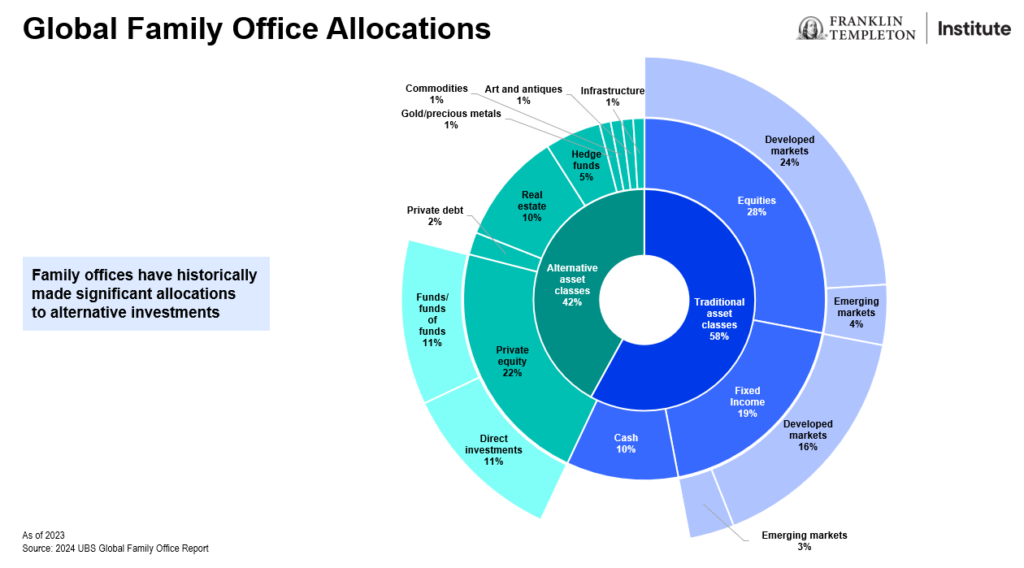In the latest episode of the Alternative Allocations podcast series, I had the opportunity to discuss lessons learned from family offices with Kate Huntington of Fiduciary Trust International. Kate and I discussed how and why family offices allocate capital to alternatives.
Kate has a unique perspective, having worked with family offices and non-profits, conducting research, due diligence and manager selection for alternative investments. I asked Kate about the role that alternatives play in client portfolios, and how their clients viewed alternatives. “As much as they love that new speculative investment and the highs that it might bring to a portfolio, the sensitivity to losing capital can be even worse than the highs of a great venture capital fund. We’re focused on reducing overall volatility.”
I asked her to compare how family offices think about alternatives relative to high-net-worth investors. “The investment thesis is the same. It’s about enhanced returns, diversification, and having a long-term mindset.” We then discussed some of the differences like access, liquidity, time horizons, and overall familiarity.
With respect to allocating capital, I cited the UBS Family Office Report, which showed significant allocations to alternatives; I also asked Kate about allocating across family portfolios.
While recognizing that allocations across families can vary greatly, Kate indicated that a 30% allocation is common, with some larger families allocating as much as 50%. As a starting point, she outlined a starting allocation, “So you have 12.5% to maybe 15% in private equity, 12.5% in hedge funds, and then the balance around 5% in private real estate.”
Kate had an interesting perspective regarding the use of evergreen vehicles (interval & tender-offer funds). “We’ve actually done a lot of work this year on evergreen vehicles and do believe that they solve for some of the challenges of investing in private markets, such as lower minimums. You’re not dealing with the J-curve1, taking four or five years to get fully invested.”
Make sure you don’t miss an episode by subscribing to Alternative Allocations on Apple, Spotify or wherever you get your podcast.
*The podcast was honored by the 2024 WealthManagement.com Industry Awards in the thought leadership category, which recognized its outstanding contributions moving the industry forward by providing insights to advisors helping to improve their understanding of alternative investments. The 2024 WealthManagement.com Industry Awards, known as the Wealthies, awarded in September 2024, based on Alternative Allocations podcast for the period between September 2022 and May 2024. For the details of the award, including the assessment methodology and judging criteria, please refer to the official award website. Franklin Templeton did not pay an entry fee or other compensation for the award.
WHAT ARE THE RISKS?
All investments involve risks, including possible loss of principal.
Investments in many alternative investment strategies are complex and speculative, entail significant risk and should not be considered a complete investment program. Depending on the product invested in, an investment in alternative strategies may provide for only limited liquidity and is suitable only for persons who can afford to lose the entire amount of their investment. Diversification does not guarantee a profit or protect against a loss.
Risks of investing in real estate investments include but are not limited to fluctuations in lease occupancy rates and operating expenses, variations in rental schedules, which in turn may be adversely affected by local, state, national or international economic conditions. Such conditions may be impacted by the supply and demand for real estate properties, zoning laws, rent control laws, real property taxes, the availability and costs of financing, and environmental laws. Furthermore, investments in real estate are also impacted by market disruptions caused by regional concerns, political upheaval, sovereign debt crises, and uninsured losses (generally from catastrophic events such as earthquakes, floods and wars). Investments in real estate related securities, such as asset-backed or mortgage-backed securities are subject to prepayment and extension risks
An investment in private securities (such as private equity or private credit) or vehicles which invest in them, should be viewed as illiquid and may require a long-term commitment with no certainty of return. The value of and return on such investments will vary due to, among other things, changes in market rates of interest, general economic conditions, economic conditions in particular industries, the condition of financial markets and the financial condition of the issuers of the investments. There also can be no assurance that companies will list their securities on a securities exchange, as such, the lack of an established, liquid secondary market for some investments may have an adverse effect on the market value of those investments and on an investor’s ability to dispose of them at a favorable time or price. Past performance does not guarantee future results.
IMPORTANT LEGAL INFORMATION
This material is intended to be of general interest only and should not be construed as individual investment advice or a recommendation or solicitation to buy, sell or hold any security or to adopt any investment strategy. It does not constitute legal or tax advice. This material may not be reproduced, distributed or published without prior written permission from Franklin Templeton.
The views expressed are those of the investment manager and the comments, opinions and analyses are rendered as at publication date and may change without notice. The underlying assumptions and these views are subject to change based on market and other conditions and may differ from other portfolio managers or of the firm as a whole. The information provided in this material is not intended as a complete analysis of every material fact regarding any country, region or market. There is no assurance that any prediction, projection or forecast on the economy, stock market, bond market or the economic trends of the markets will be realized. The value of investments and the income from them can go down as well as up and you may not get back the full amount that you invested. Past performance is not necessarily indicative nor a guarantee of future performance. All investments involve risks, including possible loss of principal.
Any research and analysis contained in this material has been procured by Franklin Templeton for its own purposes and may be acted upon in that connection and, as such, is provided to you incidentally. Data from third party sources may have been used in the preparation of this material and Franklin Templeton (“FT”) has not independently verified, validated or audited such data. Although information has been obtained from sources that Franklin Templeton believes to be reliable, no guarantee can be given as to its accuracy and such information may be incomplete or condensed and may be subject to change at any time without notice. The mention of any individual securities should neither constitute nor be construed as a recommendation to purchase, hold or sell any securities, and the information provided regarding such individual securities (if any) is not a sufficient basis upon which to make an investment decision. FT accepts no liability whatsoever for any loss arising from use of this information and reliance upon the comments, opinions and analyses in the material is at the sole discretion of the user.
Products, services and information may not be available in all jurisdictions and are offered outside the U.S. by other FT affiliates and/or their distributors as local laws and regulation permits. Please consult your own financial professional or Franklin Templeton institutional contact for further information on availability of products and services in your jurisdiction.
Issued in the U.S, by Franklin Templeton, One Franklin Parkway, San Mateo, California 94403-1906, (800) DIAL BEN/342-5236, franklintempleton.com. Investments are not FDIC insured; may lose value; and are not bank guaranteed.
1. The “J-curve” is the term commonly used to describe the trajectory of a private equity fund’s cashflows and returns. An important liquidity implication of the J-curve is the need for investors to manage their own liquidity to ensure they can meet capital calls on the front-end of the J-curve.


